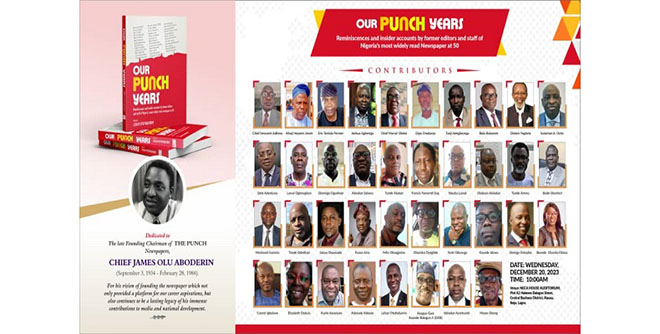
Former staff members of PUNCH Newspapers late last year unveiled a book titled “OUR PUNCH YEARS,” said to be the “reminiscences and insider accounts by former editors and staff of Nigeria’s most widely read newspaper at 50.”
The over 400-page book was written by 38 ex-punchers who gave accounts of their memorable experiences while working at The PUNCH.
The editor of the book, Lekan Otufodunrin, said the history of the successes of PUNCH Newspapers would be incomplete without recalling the roles played by former staff members at various critical times.
Otufodunrin said, “We reached out to as many former staff members as we could and invited them to contribute to the goal.”
He said ex-Punchers shared their good, exciting and not-so-pleasant experiences in the book as the contributors had the option of writing on any aspect of their stay in PUNCH.
According to Otufodunrin, there is a lot to read in this book, including the formal and dramatic way some persons joined The PUNCH, their growth, and the positions they held, as well as office politics and many more.
In this post, EDUTORIAL presents 20 reasons why you must read the book, Our Punch Years.
- You will know part of the history of the press in Nigeria.
- You will know life in the Newsroom, the jokes and why it is called the “Madhouse.”
- Coup and counter coups in Nigeria and how some journalists were robe into them.
- Naira to Dollar exchange rates in the 80s and 90s.
- You will know office politics, particularly in the newsroom.
- Politics of the 80s and 90s.
- How some journalist had the fore knowledge that MKO Abiola would be killed to “Balance the equation” when Abacha died.
- You will know some political gladiators of the 80s and 90s who are still in the corridors of power today.
- You will learn how journalists and human right activists fought the military government to attain the democracy we enjoy or endure today.
- You will know the transformation of National Security Organisation (NSO) to State Security Service (SSS) or Department of State Security (DSS).
- How newspapers were published and sold, pre-internet and technology era.
- The role of the media/journalists in the restoration of democratic government.
- How to be a creative journalist.
- Contention between newspaper houses and advert agencies on one hand and newspaper houses and vendors or their agents on the other hand.
- You will know military officers who turned to politicians after retirement.
- How Military President Ibrahim Babangida (IBB) moved Nigeria capital to Abuja on December 12, 1992.
- How Abacha’s hatchet man, Major Al-Mustapha hauled both the real and perceived enemies of the state into detention without trial.
- You will read the Choba Rape report and Odi killings of 1999 from journalist’s perspective.
- You will know how a journalist had predicted the current violent clashes between herdsmen and farmers as far back as 19999.
- Finally, you will know what has kept The Punch Newspaper on for the past 50 years despite its many face-off with both military and civilian governments.

Leave a Reply